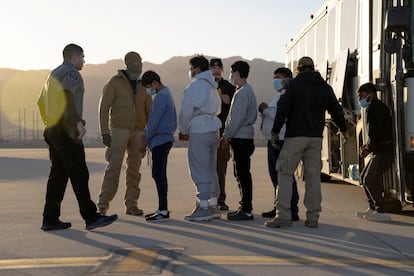Collateral damage from the war on immigration: Trump administration admits to third mistaken deportation
A Guatemalan man was sent to Mexico on the strength of an unverified statement by an unknown ICE agent, despite having judicial protection


A new error has been added to the tally of unjust deportations in the campaign launched by the Donald Trump administration. The first known case, involving the Salvadoran man Kilmar Abrego, became a symbol of the arbitrariness of the new administration’s anti-immigration crusade; by comparison, the second and third erroneous deportations have gone almost unnoticed, despite being acknowledged by the administration. This time, it concerns a Guatemalan migrant who said he fled his country to escape persecution and that he was targeted while crossing Mexico for being gay.
According to a statement filed in the Massachusetts court handling a class-action lawsuit, Immigration and Customs Enforcement (ICE) forcibly removed O.C.G.—as he is identified in the lawsuit—to Mexico due to a flaw in the software database that tracks individual deportation cases and allows authorized personnel to enter comments, Politico reported. Official documents show that O.C.G. was deported to Mexico in March because when ICE agents asked him if he was afraid of being sent there, he said no. But the fact is that O.C.G. didn’t give any answer because no one ever asked him.
Attorneys for the Department of Homeland Security stated that “upon further investigation, the defendants were unable to identify any officer who asked the O.C.G. if he feared deportation to Mexico.” His deportation was prompted by information obtained from an internal database, but it was never verified.
Upon arriving in Mexico a few weeks ago, O. C. G. requested to be transferred to his home country, Guatemala, where he faces great danger, according to his own account. In a court statement, the man explained that he arrived in the United States in March 2024, fleeing persecution and torture, but was not allowed to file an asylum application, and after being detained for a week, he was deported to Guatemala. He tried again in April of that year.
Upon arriving in Mexico, in Iztapalapa, he said he was raped and held captive by a group of men for days until his sister paid the ransom. Once in the United States, he began his asylum process. O.C.G. claims that the judge confirmed that he would not be returned to Mexico, where he feared retaliation for being gay, and that he was granted protection that prevented him from being deported to Guatemala, also due to possible persecution in the Central American country.
None of that helped him amid the current administration’s campaign to deport a million people in its first year in office. O.C.G. was locked up for two days, after which they put him on a bus with 20 other migrants bound for Mexico, ignoring his request to consult with his lawyer as well as his judicial protection. “They told me I could apply for asylum in Mexico, but that they would keep me locked up for the months it took to make a decision, or that I could simply accept being taken back to Guatemala. After what had happened to me in Mexico, I was too afraid to apply for asylum there. I had no safe options, so I told them to send me back to Guatemala,” he explained.
The O.C.G. case is, for now, the latest error acknowledged by the government in its deportations. This was preceded by the case of Abrego García, whom the administration accuses without evidence of belonging to the MS-13 criminal gang. The executive branch is violating the directives of the federal judge handling the case and even those of the Supreme Court, which has repeatedly requested that the government facilitate his return to the United States. Daniel Lozano-Camargo, a Venezuelan man sent to El Salvador in March despite a court-approved settlement requiring his asylum application to be adjudicated first, should never have been deported either.
While O.C.G. is sheltering somewhere in Guatemala, his lawyers are seeking to appeal to the courts to try to twist the government’s hand and have him returned to the United States. So far, the administration has ignored all the judges.
Sign up for our weekly newsletterto get more English-language news coverage from EL PAÍS USA Edition
Tu suscripción se está usando en otro dispositivo
¿Quieres añadir otro usuario a tu suscripción?
Si continúas leyendo en este dispositivo, no se podrá leer en el otro.
FlechaTu suscripción se está usando en otro dispositivo y solo puedes acceder a EL PAÍS desde un dispositivo a la vez.
Si quieres compartir tu cuenta, cambia tu suscripción a la modalidad Premium, así podrás añadir otro usuario. Cada uno accederá con su propia cuenta de email, lo que os permitirá personalizar vuestra experiencia en EL PAÍS.
¿Tienes una suscripción de empresa? Accede aquí para contratar más cuentas.
En el caso de no saber quién está usando tu cuenta, te recomendamos cambiar tu contraseña aquí.
Si decides continuar compartiendo tu cuenta, este mensaje se mostrará en tu dispositivo y en el de la otra persona que está usando tu cuenta de forma indefinida, afectando a tu experiencia de lectura. Puedes consultar aquí los términos y condiciones de la suscripción digital.








































